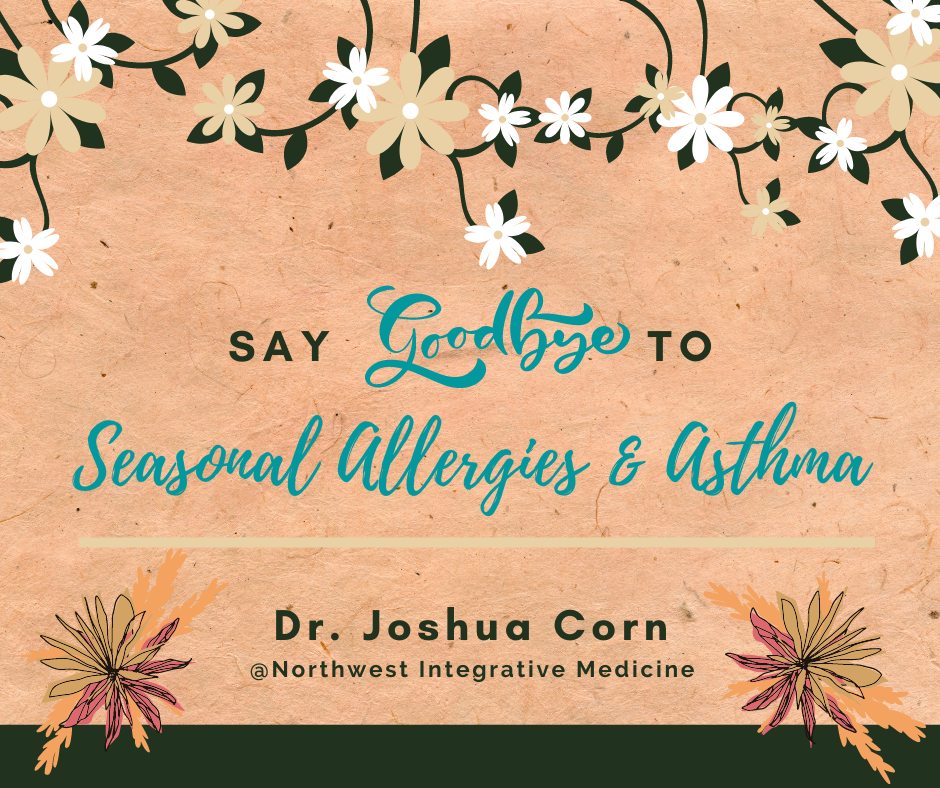Spring is here and for many of us, that means seasonal allergies and asthma are here, too. Seasonal allergies and asthma are often worsened by pollen from trees, grasses, and weeds. In allergy sufferers and those with asthma, the immune system mistakes pollen for a threat and mounts a response to rid the body of it. This response triggers increased histamine release, mucus production, and inflammation, which leads to congestion, runny nose, itchy eyes, sneezing, rashes and headaches associated with allergies and the bronchial inflammation, irritation, and airway reactivity associated with asthma.
The symptoms can be miserable but there are many natural ways to help reduce the severity of allergy and asthma symptoms.
Reduce Exposure to Allergens
When we go outside, pollen circulating in the air tends to stick to our hair, skin, and clothing, meaning that even when we go inside, we can be exposed to pollen. Reducing exposure to pollen is an important way to combat allergies.
- Remove clothing and shoes worn outside as soon as you get home. Do not wear shoes around the house.
- Shower before bed to remove pollen from skin and hair.
- Changes bed linens weekly.
- Wear a pollen mask for doing outdoor chores such as mowing the lawn or gardening.
- Keep windows closed on days with high pollen counts.
- Keep indoor air clean with a HEPA filter or by using air conditioning. Make sure to change filters in central air conditioning systems before use.
- Vacuum weekly.
- Bathe pets regularly.
Vitamin C
Vitamin C is an antioxidant that may be helpful for reducing allergy symptoms. A recent study in South Korea found that children who had higher dietary intake of vitamin C had fewer allergy symptoms. Another study found that participants who took antioxidants, including vitamin C, along with over-the-counter steroid nasal spray noticed a significant improvement in nasal allergy symptoms. Vitamin C may also be helpful for those with asthma. There is limited research available, but some research suggests that vitamin C may help reduce asthma related to respiratory infections or exercise.
Vitamin C can be found in fruits and vegetables including broccoli, spinach, cauliflower, kale, kiwi and citrus fruits. It’s important to remember that vitamin C is water soluble and breaks down easily with cooking so don’t overcook your veggies!
Quercetin
Quercetin is a compound found in many fruits and vegetables including onions, apples, berries, and grapes. This compound has been shown to help reduce the immune response responsible for the symptoms of seasonal allergies. Quercetin seems to inhibit the release of histamine and decrease inflammatory molecules released by the immune system.
Quail Egg Powder
One of the most unique natural interventions for seasonal allergies is quail egg powder. Quail eggs contain compounds that block the effects of pollen, mold, dust, and animal dander on the nasal cavity, preventing the immune response that causes nasal symptoms like congestion.
A small trial from 2014 found that participants who used a proprietary blend of quail egg experienced significant improvements in nasal inspiratory flow (how easily they could take a breath in through their noses) and quality of life. I have a few clients who use quail egg supplements during allergy season and swear by them.
Coffee and Caffeine
Research suggests that coffee consumption is related to a lower prevalence of asthma. This may be due to the effects of caffeine on the airways. Caffeine is structurally similar to theophylline, a bronchodilator. Researchers are still working on figuring out exactly how coffee and caffeine may work in asthma and how much would be beneficial. For coffee drinkers who have asthma, this research is a great excuse for that morning cup o’ Joe.
Beyond natural options for improving symptoms, our physicians are knowledgeable about pharmaceutical treatment options that may help reduce your symptoms. Remember, asthma can be a serious condition if it is not treated and in severe episodes, could even be fatal. Fortunately, asthma and allergies are manageable and treatable. Schedule a visit with one of our doctors to discuss options and get an action plan in place to help you feel better this spring.
References
- https://www.mayoclinic.org/diseases-conditions/hay-fever/in-depth/seasonal-allergies/art-20048343
- Seo JH, Kwon SO, Lee SY, et al. Association of antioxidants with allergic rhinitis in children from seoul. Allergy Asthma Immunol Res. 2013;5(2):81–87
- Chauhan B, Gupta M, Chauhan K. Role of antioxidants on the clinical outcome of patients with perennial allergic rhinitis. Allergy Rhinol (Providence). 2016;7(2):74–81.
- Hemilä H. Vitamin C and common cold-induced asthma: a systematic review and statistical analysis. Allergy Asthma Clin Immunol. 2013;9(1):46. Published 2013 Nov 26. doi:10.1186/1710-1492-9-46
- Mlcek J, Jurikova T, Skrovankova S, Sochor J. Quercetin and its anti-allergic immune response. Molecules. 2016 May 12;21(5). doi: 10.3390/molecules21050623
- Benichou AC, Armanet M, Bussière A, Chevreau N, Cardot JM, Tétard J. A proprietary blend of quail egg for the attenuation of nasal provocation with a standardized allergenic challenge: a randomized, double-blind, placebo-controlled study. Food Sci Nutr. 2014 Nov;2(6):655-63. doi: 10.1002/fsn3.147. Epub 2014 Jul 20.
- Alfaro TM, Monteiro RA, Cunha RA, Cordeiro CR. Chronic coffee consumption and respiratory disease: A systematic review. Clin Respir J. 2018 Mar;12(3):1283-1294. doi: 10.1111/crj.12662. Epub 2017 Jul 7. PMID: 28671769.

